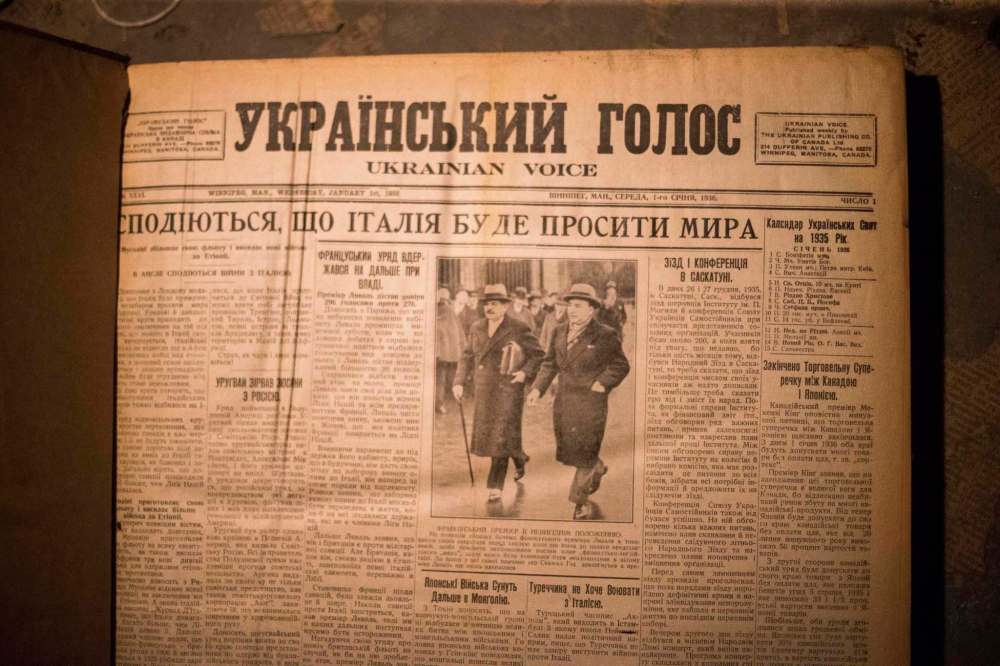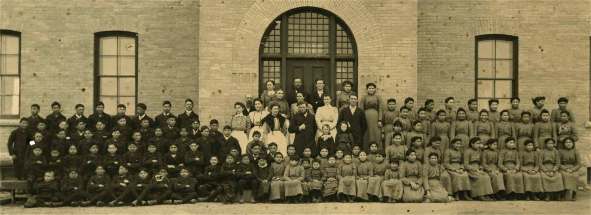‘It was a people’s paper’ Community united by Ukrainian Voice, closing after 108 years
Read this article for free:
or
Already have an account? Log in here »
To continue reading, please subscribe:
Monthly Digital Subscription
$0 for the first 4 weeks*
- Enjoy unlimited reading on winnipegfreepress.com
- Read the E-Edition, our digital replica newspaper
- Access News Break, our award-winning app
- Play interactive puzzles
*No charge for 4 weeks then price increases to the regular rate of $19.00 plus GST every four weeks. Offer available to new and qualified returning subscribers only. Cancel any time.
Monthly Digital Subscription
$4.75/week*
- Enjoy unlimited reading on winnipegfreepress.com
- Read the E-Edition, our digital replica newspaper
- Access News Break, our award-winning app
- Play interactive puzzles
*Billed as $19 plus GST every four weeks. Cancel any time.
To continue reading, please subscribe:
Add Free Press access to your Brandon Sun subscription for only an additional
$1 for the first 4 weeks*
*Your next subscription payment will increase by $1.00 and you will be charged $16.99 plus GST for four weeks. After four weeks, your payment will increase to $23.99 plus GST every four weeks.
Read unlimited articles for free today:
or
Already have an account? Log in here »
Hey there, time traveller!
This article was published 23/08/2018 (2665 days ago), so information in it may no longer be current.
In early August, as the final days drew nearer, Bill Strus tapped out an email to a Free Press journalist. Would there be any interest, he asked, in the fact the iconic Ukrainian Voice newspaper would soon publish its last?
And it was Strus who made the decision to shutter the paper, after 108 years of publication. That’s what he had been brought here to do. Yet decisions like this weigh heavy on the heart, even when they are clear on paper.
So now, at the end of it all, Strus wanted the Ukrainian Voice to be remembered.

“I guess I do not want to go quietly into the night,” he wrote.
Strus is the paper’s 12th and final publisher, but — by his own admission — he is not a wordsmith. His background is numbers, so let’s start with a few: figures can tell the story of Ukrainians in Manitoba as clearly as any words do.
Here’s one: 1891, the year of the first official Ukrainian immigration to Canada. There were Ukrainians living here before that, but it was 1891 when two men made landfall in Nova Scotia and headed west, to the interior Prairie.
In Manitoba, those men saw vast opportunity. One settled near Gretna, while the other returned to his homeland that winter. There, he met with some misadventure, but not before his tales of Canadian lands stirred up interest.
Soon, Ukrainian families began making the journey, encouraged by a colonial government eager to settle the young country with European farmers and workers. By 1914, as many as 200,000 Ukrainians had immigrated.
The early years were hard ones for many, yet on the Prairies, the community began to flourish: by the 2016 Census, more than 180,000 Manitobans — nearly one in six of us — raised a hand to be counted as Ukrainian-Canadian.
For decades, whether they were newly arrived or second-generation, one newspaper brought them together.
Founded in 1910, and first printed out of a little space on Selkirk Avenue, the Ukrainian Voice was not the first Ukrainian-language newspaper in Canada. Yet it soon became one of the young community’s most essential.
The paper covered everything connected to Ukrainian life. There were clear-eyed columns on political matters — one editor was even courted by the New York Times — and stories on farming, church news and new education.
“That’s what we needed to get ahead,” Strus says of the focus on education.

As a girl growing up in tiny Gardenton, near the southeastern edge of Manitoba, Olena Garrity — she goes by Helen, in English — remembers submitting articles for a children’s page, which sometimes attracted pen pals.
“People would read and they would write to you,” Garrity recalls. “I would get somebody from Dauphin, somebody from High River, Alta., and they asked me about myself. I thought that was a very good little (section) there.”
Garrity’s parents subscribed in 1940, when she was just five years old; she took out her own subscription as an adult in 1960. At the time, she says, the paper was “very, very important.” Each new issue was quickly devoured.
Above all, there is this: the Ukrainian Voice was one of the first publications to call Ukrainians by that name. For years, Ukrainians were described by other regional monikers, but the paper’s editors stood up for their identity.
“It pioneered a philosophy of, we should be proud of our heritage, but we should be passionate about the country we lived in,” Strus says. “It gave us an identity. We could proudly walk around the country, holding our heads high.”
That message travelled far and wide. In its heyday of the 1960s, the newspaper boasted a staff of 35 and a circulation of more than 22,000. It reached readers across Canada, into the United States and deep into Europe.
But history is history, and numbers are numbers. Here is where the numbers begin to change, and tell a different story. This one ends here, with the Ukrainian Voice falling silent for just the third time in its century-long history.
Of those 180,000 Ukrainian-Canadians in Manitoba today, only around 17,000 speak Ukrainian; barely half as many named it as a mother tongue than a decade ago. Only 2,700 people use it as their main language at home.
This slow erosion of the language, along with the evolution of Ukrainian-Canadian identity in third-generation Canadians and beyond, began to chip at the Ukrainian Voice’s reach. Slowly but surely, the paper ebbed away.

By this year, monthly subscriptions had sunk to just 300, far below what was needed to cover expenses. The paper, which once published weekly, cut its schedule to once a month. Still, the company hemorrhaged cash.
At a crossroads, last year the board of Triton Press Ltd., which owns the paper, enlisted Strus. Based in Hamilton, Ont., he had a background in accounting and entrepreneurship, and is active in Ukrainian-Canadian organization.
They asked him to take a look at the books, to see what could be done. The numbers didn’t lie, Strus says with a sigh, and his recommendation was clear: after 108 years in circulation, the Ukrainian Voice needed to fade away.
There is no avoiding it, no way around it. Strus knows that. Yet as he began the process of winding up the business and closing the newspaper’s old Main Street office, he marinated in the sadness of the decision.
“The hardest thing I had to do here was deal with the history,” Strus says. “Selling this building, I did in half an hour, with a handshake… then it was a matter of co-ordinating, how do we get the history kept and preserved?”
For that, there are some promising options. The University of Manitoba’s Slavic studies department will hold the paper’s archives; it will soon digitize them for future generations of scholars and interested members of the public.
And in a stroke of genius, Strus obtained a trademark for the Ukrainian Voice’s name; it’s a classic, he thinks. It has a ring to it. Maybe one day, he hopes, someone else will find a way to make it resonate across Canada again.
Still, it’s sad. All month, longtime subscribers have been trickling into the paper’s office, just to say goodbye. Though Garrity is on the paper’s board, she’s still accepting it: “I never, ever thought it would close,” she says.
But maybe, in a way, the historic paper goes to sleep now under the tree of its successes. For diasporic communities, the impulse to connect hasn’t vanished; it’s just that now, there are new ways of connecting.

The paper’s early editors strove to give Ukrainians an identity and a voice in the Canadian mosaic. If they were here now, maybe they would thrill to see Ukrainian names woven through Manitoba; a strong community, vibrant.
What they built, right from that first printing press on Selkirk Avenue, hasn’t vanished. It is all around us. The legacy of the paper is written in a heritage remembered; when it was most needed, that newspaper mattered.
One year, Garrity remembers, a drought swept through the province, devastating local farmers. That summer, the Ukrainian Voice ran some articles with a notably positive tone. She saw how that seemed to spread a little cheer.
“I’d like them to remember it was a people’s paper,” she says.
“If there were any problems or anything, you were always supported by the Ukrainian Voice. You could always write to the newspaper and cry on their shoulder.”
melissa.martin@freepress.mb.ca
Our newsroom depends on a growing audience of readers to power our journalism. If you are not a paid reader, please consider becoming a subscriber.
Our newsroom depends on its audience of readers to power our journalism. Thank you for your support.










